Carbon tax, climate change: Egmont candidates and voters weigh in
'Once it's too late, it's too late,' says one voter. But how far do you take it, asks another
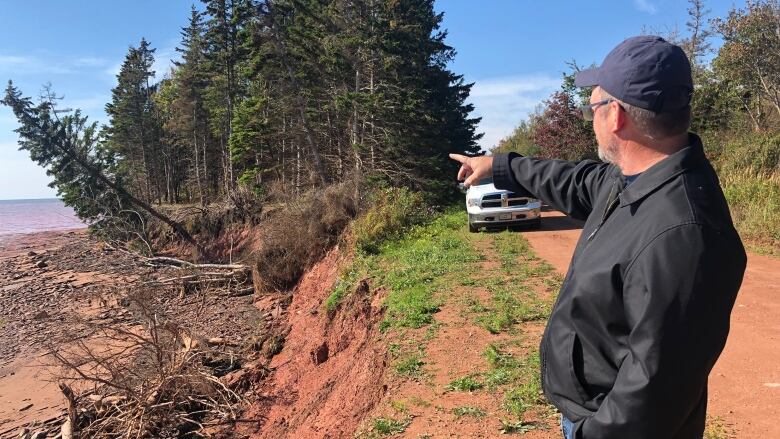
After spending the last 30 years on P.E.I. working to protect and enhance the natural environment, Dale Cameron says there's no question in his mind:Prince Edward Island is feeling the effects of climate change.
"Shoreline erosion is probably the [effect] that most people can identify with right off the bat," said Cameron, project co-ordinator with the Prince County chapter of Trout Unlimited Canada.
But he said they're also seeing the effectsupland in the rivers and streams he works to protect as habitat for wildlife.
"With the changes in climate [it's] dry and then you know, when we do get rain, we get a deluge of rain. It certainly affects everything for sure."
Watershed groups on P.E.I. are still trying to make repairs weeks after post-tropical storm Dorian damaged streams, pathways and infrastructure like bridges with torrential rains and fallen trees.

At one coastal site within the Trout River watershed, Cameron said a two-metre-deep swath of coastline disappeared literally overnight, swallowed up by Dorian.
Climate change has emerged as a dominant issue in the current federal election, which Cameron saidis how it should be.
"I don't know that I have the answers as to how to deal with it," Cameron said. "But I think it's certainly something that everybody should make a priority."
Keep or scrap the carbon tax?
The cornerstone of the Trudeau government's plan to reduce greenhouse gas emissions, which contribute to climate change,has been the implementation of a price on carbon across the country.
Some provinces have their own plans in place based on federal guidelines. In provinces which didn't meet those guidelines, Ottawa has imposed its own federal carbon tax.
In theimplementation on P.E.I., Ottawa allowed the province to drop its provincial gas tax in order to erase all but one cent of the increase in price when the carbon tax came into effect April 1, 2019. Gas taxes will rise another cent in 2020.
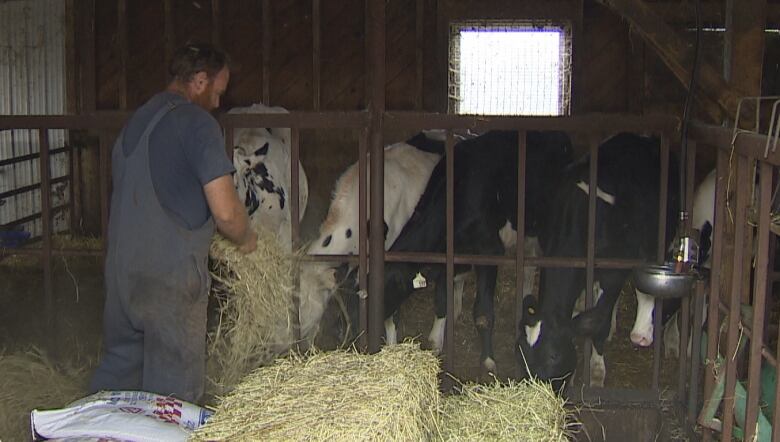
But even that increase concerns dairy farmer Daniel MacDonald of Glengarry.
MacDonald is a former candidate for the provincial Progressive Conservatives on P.E.I. As a farmer he doesn't have to pay the carbon tax on the fuel he uses for his business.
But even so, he's worried about the tax having an impact on his bottom line through an increased cost of shipping goods to his farm.
"Whether it's through feed or plastics or anything of that nature, you know the tax is passed on to us and we just have to absorb that tax and it can be very expensive," MacDonald said.
He worries Canada's efforts to reduce emissions won't mean much if other countries like the U.S. don't follow suit.
"If we put all these measures into place, and the country next door isn't doing anything, the little bit that we're saving, is it a help?" MacDonald asked.
"I'm not saying that we shouldn't be doing anything, [we can take] all sorts of measures but how far do you take them?"
Conservatives: Scrap the carbon tax
The Conservative candidate in Egmont, LoganMcLellan, has a message for voters like MacDonald: his party would let them keep more money in their wallets.
How will the Conservatives do that? "We'd remove the carbon tax," said McLellan. "That would be gone."
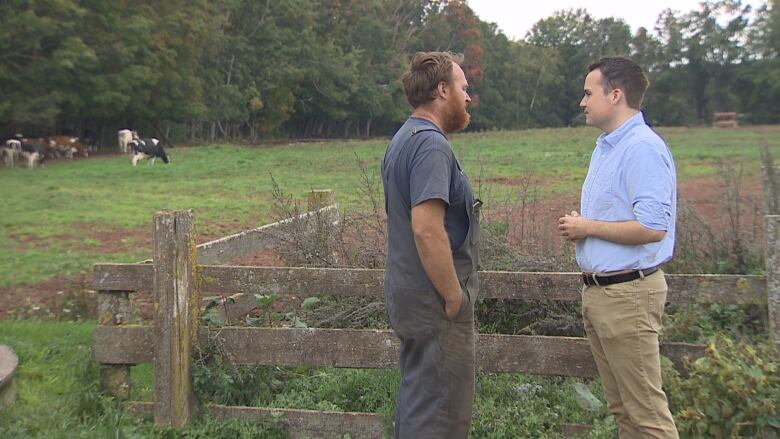
In its place,McLellan explained the Conservative plan to require large polluters pay into a "technology fund" to finance the development and export of green tech, saying the Conservatives want to be "going after the big polluters not the daily commuters."
"If you live in Tignish and you drive to Summerside every day for work, how do you reduce your pollution?"
NDP: Invest in clean public transit
The candidate for the New Democrats in Egmont has her own answer to that question: invest in public transit.
"Part of the problem for many rural areas, especially P.E.I., is there's no way to get from North Cape to Summerside, or from Morell to Charlottetown without driving," said Sharon Dunn.
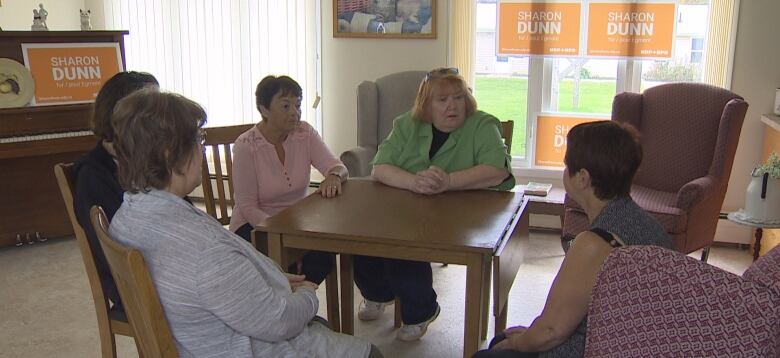
She pointed to the New Democrats' plan to invest in emissions-free buses and electrify all transit fleets in the country by 2030. The party would also remove the federal tax from zero-emission vehicles.
The New Democrats would also leave the carbon tax in place, while vowing to further crack down on large industrial emitters of greenhouse gases.
Greens: Carbon tax not enough
The Green Party has long advocated for a carbon tax. But the party has noted, as have experts like the parliamentary budget officer in Ottawa, that the Liberal carbon taxon its ownwon't allow Canada to meet its goal to reduce carbon emissions 30 per cent below 2005 levels by 2030.
Egmont Green candidate Alex Clark said if Islanders have a problem with the carbon tax, it's the way it was put forward to them, and how the revenues are being spent.
Most of the revenues from P.E.I.'s carbon tax are paying to provide Islanders with free driver's licences and to reduce the cost of vehicle registrations. Islanders aren't receiving rebate cheques as are residents of some other provinces.
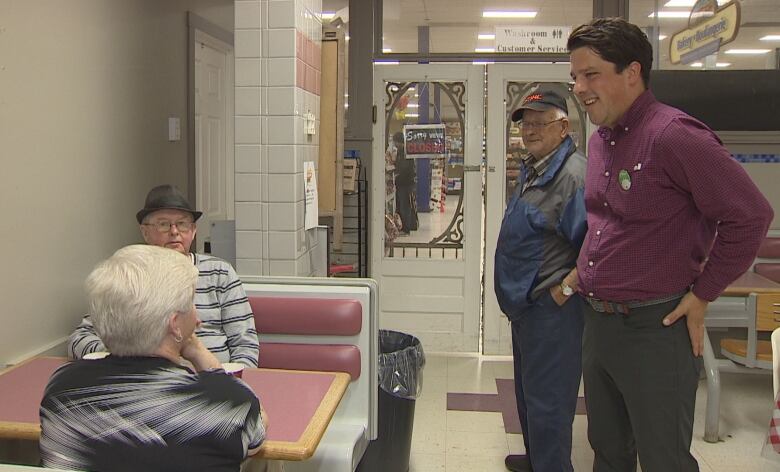
"I hear about the carbon tax lots at the door," said Clark. "They want to know, 'well if I'm paying this tax what is this doing? How is this carbon tax helping our environment?'"
The Greens are pledging to maintain a revenue-neutral carbon tax, returning the proceeds to Canadians, as part of an ambitious plan to cut emissions 60 per cent below 2005 levels by 2030.
Liberals: Reduce emissions, grow economy
The incumbent Liberal candidate in Egmont, Bobby Morrissey, described his party's climate plan as the best choice, saying the Conservatives would move too slowly on reducing emissions and the Greens too quickly.
"In my opinion the Liberal Party has got it right," Morrissey said. "Our position is that we can reduce carbon emissions while growing the economy at the same time."
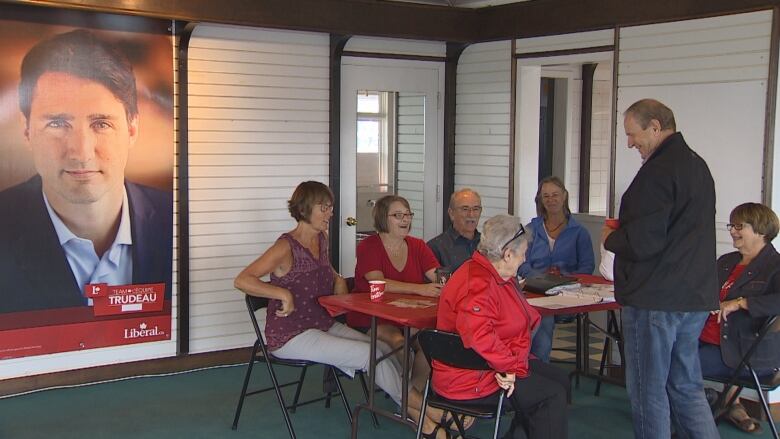
Morrissey expressed particular concern about the Green Party's goal to make Canada a net-zero emitter by 2050.
He said the Greens haven't explained how that target "will impact our farmers, how it'll impact our fishermen, how it will impact our industrial base."
But the day after that interview, the Liberals announced they, too, would set a target of net-zero emissions by 2050 although the party has been criticized for providing few details as to how that target would be achieved.
Once-in-a-century flooding to become annual event, says UN
On Wednesday, the United NationsIntergovernmentalPanel on Climate Change delivered its most recent dire warning, saying oceans are warming and becoming more acidic, losing oxygen in the process.
That, scientists warn, will lead to decreases in aquatic life and thus fishing catches. Meanwhile, the IPCC saidby the year 2060, coastal flooding in the Maritimes and B.C. that used to happen once in a century will be annual events.
Surveying damage from the last major storm some of it irreparable, like the two metres of coastal cliffs that came down Dale Cameron said he doesn't think there's much time left to debate what course of action to take.
"I don't know how much longer we can think about it," he said. "Once it's too late, it's too late. Hopefully we're not there."












_(720p).jpg)


 OFFICIAL HD MUSIC VIDEO.jpg)
.jpg)



























































































